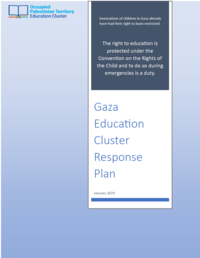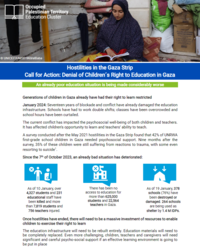Resources
Request support on coordination, information management, capacity development or other education in emergencies areas.
Demande de soutien en coordination, gestion de l’information, développement des capacités et autres domaines de l'éducation en situation d'urgence.
لطلب الدعم في مجال التنسيق ، إدارة المعلومات ، تنمية القدرات أو في اي مجال من مجالات التعليم في مناطق الطوارئ
Solicitar apoyo en coordinación, gestión de la información, desarrollo de capacidades u otra áreas en educación en emergencias.
Featured Resources
below you can find selected tools

COVID-19 Resources
View resources to support education in emergencies coordination during the COVID-19 pandemic.

Guidance on Education Cluster Co-Leadership Arrangements at the Country Level
Indicative Guidance for the establishment and management of co-leadership arrangements at the country level.

Inter-agency Network for Education in Emergencies
For technical education in emergencies resources, please visit the INEE website.
- Coordination: Cluster Strategy
- Emergency: Conflict
- HPC: Strategic Planning
- Technical Areas: Attacks on Education
- Coordination: Advocacy
- Emergency: Conflict
- HPC: Resource Mobilisation
- Technical Areas: Attacks on Education
- Coordination: Knowledge Mangement
- Emergency: Conflict
- HPC: Needs Assessment & Analysis
- Technical Areas: Attacks on Education
Safeguard Yemen’s Future: Protect Education from Attack
Attacks on education in Yemen are exacerbating an already devastating crisis for education, said the Global Coalition to Protect Education from Attack (GCPEA) in a briefing paper, Safeguard Yemen’s Future: Protect Education from Attack. According to Yemen’s Education Cluster, 2 million children are…
- Communicaiton: Communication Materials
- Coordination: Advocacy
- Emergency: Conflict
- HPC: Implementation & Monitoring, Resource Mobilisation
- Technical Areas: Attacks on Education, Protection
Schools under Attack in Syria: A monitoring report on the impact of attacks on Syrian schools by the Southern Turkey Education Cluster (Syria response)
Syria is one of the most heavily affected countries by attacks on education.In Syria, schools arebombed, damaged, looted and destroyed on a regular basis, many places of learning are now deserted as children and teachers flee to safety.Since the conflict began, more than 4,200 schoolshave been…
- Communicaiton: Communication Materials
- Coordination: Advocacy
- Emergency: Conflict, Complex
- HPC: Implementation & Monitoring, Resource Mobilisation
- Technical Areas: Attacks on Education, Protection
Guide to Education in Emergencies Needs Assessments
The purpose of the Guide and Needs Assessment Packages to provide practical, relevant guidance and resources to education in emergencies (EiE) coordination staff conducting, coordinating and participating in secondary data reviews and joint, harmonized and/or multi-sector needs assessments.
- Coordination: Needs Assessment, Inter-Sector Coordination
- HPC: Needs Assessment & Analysis
- Technical Areas: Accountability to Affected Populaiton, Localisation
Guide to Developing Education Cluster Strategies
The purpose of this Guide and accompanying Strategy Package is to provide practical, relevant guidance and resources to education in emergencies (EiE) coordination staff on how to develop and update an Education Cluster Strategy.
- Coordination: Cluster Strategy, Inter-Sector Coordination
- HPC: Strategic Planning
- Technical Areas: Accountability to Affected Populaiton, Localisation
Education Under Attack 2018 - Ukraine Country Profile in GCPEA Report
The conflict in Ukraine has led to a splintered education system, and fighting disrupted children’s access to education near the contact line. Rockets, heavy artillery, and mortars launched by all parties to the conflict damaged or destroyed hundreds of schools on both sides of the contact line. In…
- Communicaiton: Communication Materials
- Coordination: Advocacy
- Emergency: Conflict
- HPC: Implementation & Monitoring, Resource Mobilisation
- Technical Areas: Attacks on Education, Protection
Localisation in Coordination
"The World Humanitarian Summit recognised that increased localisation is fundamental to the delivery of a dignified and effective humanitarian response, concluding that humanitarian action should be “as local as possible, as international as necessary.” The associated Grand Bargain emphasized the…
- Coordination: Coordination, Cluster Strategy, Inter-Sector Coordination
- HPC: Strategic Planning
- Technical Areas: Localisation
Localisation Checklist
This checklist provides guidance for ensuring local organisations are deliberately and explicitly engaged throughout the Cluster Strategy document and development process. Local partnership is an essential element of any emergency response, and Strategy development is a key moment to draw on the…
- Coordination: Cluster Strategy
- HPC: Strategic Planning
- Technical Areas: Localisation
Filter results
Communication(selected )
Coordination(selected )
Country(selected )
Emergency(selected )
Humanitarian Programme Cycle(selected )
Language(selected )
Publication Date(selected )
Publisher(selected )
Resource Type(selected )
Technical Areas(selected )
Can’t find what you’re looking for?
Contact your relevant language Help Desk









